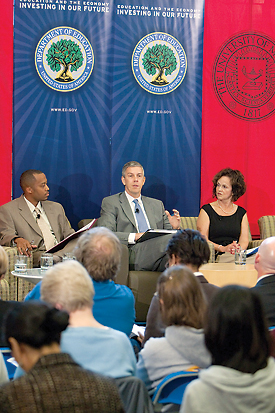U.S. Secretary of Education Arne Duncan said School of Education (SoE) efforts to bridge the gap between teaching theory and practical classroom connections for teachers and students are improving the state of education at a critical time.
“I think education is the crucial issue of our generation. Education defines opportunity. The stakes for our country have never been higher,” Duncan said.

U.S. Secretary of Education Arne Duncan (center) is joined by Superintendent of Ypsilanti Schools Dedrick Martin (left) and School of Education Dean Deborah Loewenberg Ball during a panel discussion at SoE. Photo by Martin Vloet, U-M Photo Services.
Duncan appeared Thursday at the SoE in a program focused on how to promote excellence in America’s classrooms, particularly for disadvantaged and underserved students. President Mary Sue Coleman offered opening remarks, while SoE Dean Deborah Loewenberg Ball moderated a panel of faculty experts weighing in on the issue.
“Quality education is absolutely essential to national success,” Coleman said. “Our achievements as individuals, as states and as a nation are rooted in robust classrooms, quality teachers and strong equitable public policy. We teach and research all of these factors and more.”
Ball emphasized that U-M has sought to break the mold to improve teacher preparation and teacher quality. These efforts include better instruction for underserved children who traditionally are more likely to be taught by inexperienced teachers.
“We have redesigned the program to focus directly on teacher’s skills,” Ball said. “We’re actually putting them in schools and supervising them critically, then evaluating their performance.”
Duncan’s appearance at U-M came during a bus tour to several cities through the Midwest that included planned stops in Pennsylvania, Ohio, Indiana, Wisconsin and Illinois. He discussed the Obama administration’s commitment to investing in education to improve economic prospects for youth, and boosting the quality of education.
Panelist Bob Bain, associate professor of education, SoE, and history, LSA, echoed Ball, saying the key to improving instruction is connecting education theory to classroom teaching. “We need to focus on specific practices: How do you teach a concept? We practice this by role playing with peers, then working in a small classroom,” he said.
Duncan said that in talking with hundreds of teachers, many don’t feel prepared to deal with the challenges presented in real classrooms. “They got lots of the theory of education, the philosophy of education, and not enough teaching skills,” he said, adding they should be trained in such skills as undergraduates.
Duncan praised the SoE for providing that instruction. “The model you have described here has extraordinary national implications,” Duncan said.
To underscore the importance today of education as a way to prepare youth, Duncan said that as a young person in Chicago he knew of friends who would drop out of school to take readily available jobs in the stockyards — jobs not so available today.
Panelist Dedrick Martin, Ypsilanti Public Schools superintendent, said his district addressed the traditional approach of pairing the least experienced teachers with the most challenged students. “I flipped that,” Martin said, adding he saw improvement when assigning the most experienced teachers to these students.
Panelist Robert Sellers, professor of education, SoE, and psychology, LSA, discussed connecting teachers to students of varied backgrounds. He said the SoE does this by securing teaching experiences in varied settings.
“I can’t teach in my classroom what it’s like to be African American through lecturing,” Sellers said. “It’s important for teachers to see children from diverse backgrounds as being educable, as being persons for whom I have the skills to help.”
“I think that it was a very smart panel, including researchers, practitioners and policy makers working at all levels; it was a valuable experience,” said audience member Monica Bhatt, a SoE doctoral student from Plymouth.

